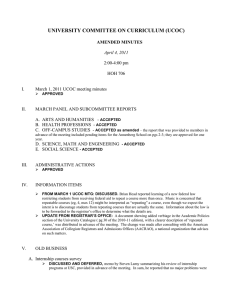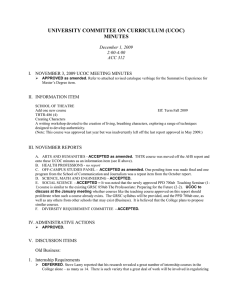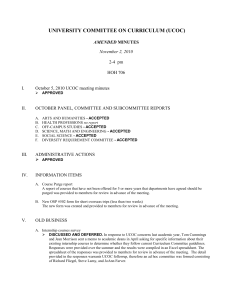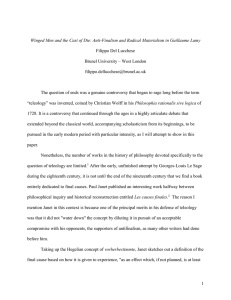UNIVERSITY COMMITTEE ON CURRICULUM (UCOC)
advertisement
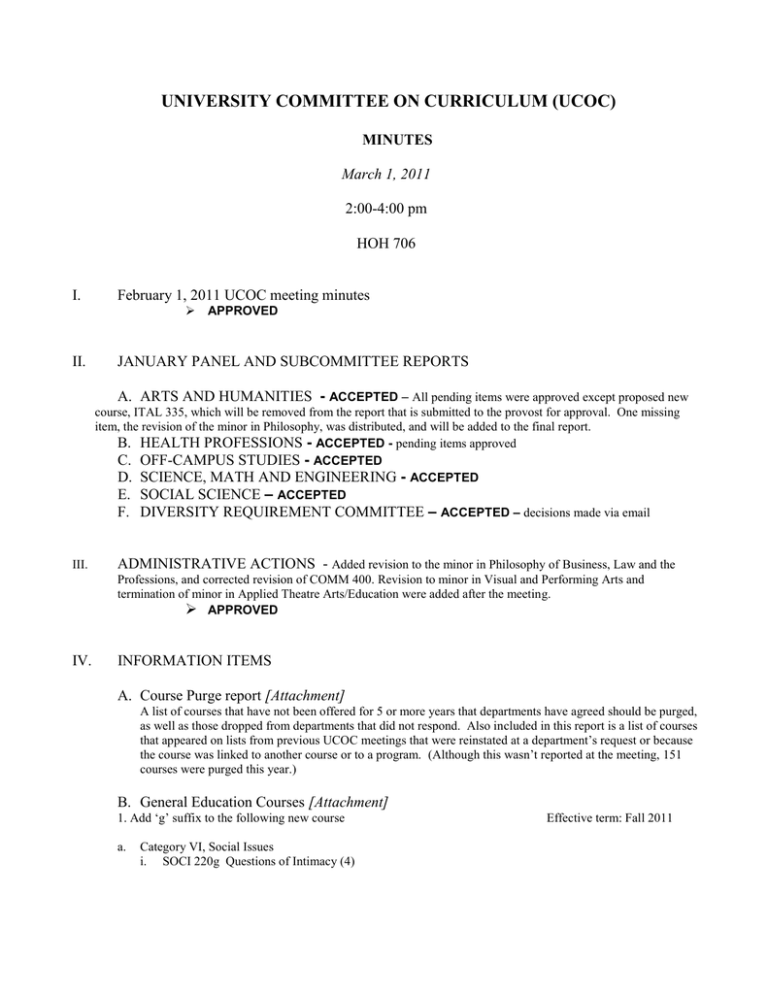
UNIVERSITY COMMITTEE ON CURRICULUM (UCOC) MINUTES March 1, 2011 2:00-4:00 pm HOH 706 I. February 1, 2011 UCOC meeting minutes II. APPROVED JANUARY PANEL AND SUBCOMMITTEE REPORTS A. ARTS AND HUMANITIES - ACCEPTED – All pending items were approved except proposed new course, ITAL 335, which will be removed from the report that is submitted to the provost for approval. One missing item, the revision of the minor in Philosophy, was distributed, and will be added to the final report. B. HEALTH PROFESSIONS - ACCEPTED - pending items approved C. OFF-CAMPUS STUDIES - ACCEPTED D. SCIENCE, MATH AND ENGINEERING - ACCEPTED E. SOCIAL SCIENCE – ACCEPTED F. DIVERSITY REQUIREMENT COMMITTEE – ACCEPTED – decisions made via email III. ADMINISTRATIVE ACTIONS - Added revision to the minor in Philosophy of Business, Law and the Professions, and corrected revision of COMM 400. Revision to minor in Visual and Performing Arts and termination of minor in Applied Theatre Arts/Education were added after the meeting. APPROVED IV. INFORMATION ITEMS A. Course Purge report [Attachment] A list of courses that have not been offered for 5 or more years that departments have agreed should be purged, as well as those dropped from departments that did not respond. Also included in this report is a list of courses that appeared on lists from previous UCOC meetings that were reinstated at a department’s request or because the course was linked to another course or to a program. (Although this wasn’t reported at the meeting, 151 courses were purged this year.) B. General Education Courses [Attachment] 1. Add ‘g’ suffix to the following new course a. Category VI, Social Issues i. SOCI 220g Questions of Intimacy (4) Effective term: Fall 2011 UCOC Minutes March 1, 2011 Page 2 of 4 V. OLD BUSINESS A. Internship courses survey NO NEW INFORMATION TO REPORT. FROM THE MINUTES OF THE 2/1/11 UCOC MEETING: DEFERRED: Work continues on the report. FROM THE MINUTES OF THE 1/11/11 UCOC MEETING: DISCUSSED AND DEFERRED: Report by Steve Lamy report is in development. He reported that overall, most departments follow the guidelines; professional schools follow them more closely than non-professional schools. Findings include that some internships are paid and some are not; some schools leave it up to the student to find the internships and others excel in matching students with opportunities, and fewer departments have staff members assign grades than initially assumed/reported. A best-practices template will be developed and should be posted along with the internship guidelines in the Curriculum handbook. Recommendations are expected to include requiring pre-approval of internships and that the grade be assigned by a faculty member (NTT OK), not staff. It was also noted that medical clinical experiences are not internships covered by these guidelines. A report is in process, to be provided for the February UCOC meeting. FROM THE MINUTES OF THE 12/7/10 UCOC MEETING: DISCUSSED AND DEFERRED. A summary of the responses was provided at the November meeting. An ad hoc committee of Steve Lamy, JoAnn Farver, and Richard Fliegel was formed at that meeting. Steve Lamy was unable to attend the meeting; Richard Fliegel attended in his absence, and reported that the ad hoc committee has yet to meet. VI. NEW BUSINESS . DISCUSSION: Susan Metros, Deputy CIO and Associate Vice Provost for Technology Enhanced Learning, attended the meeting to discuss matters of concern to UCOC members regarding distance learning. The main purpose of Technology Enhanced Learning is to help faculty with the use of technology – often including distance learning technologies – to support teaching and learning. The majority use Blackboard or PowerPoint or clickers; some teach hybrid, utilizing online resources in conventional classes. Fewer have totally online courses and programs, and these are exclusively professional programs at the Masters level – Academic Medicine in Medicine, Regulatory Science in Pharmacy, Master of Arts in Teaching in Education, Master of Social Work, Gerontology, Geographic Information Science Technology, with plans for online Masters in Policy, Planning and Development, and in Communication. In every case, the online program is either offered on campus, or it is possible to offer it on campus. President Nikias has repeatedly stated that the undergraduate offerings should be residential. The Center for Excellence in Teaching has a group that will go through a faculty member’s syllabus to suggest ways to integrate distance learning into it. They also are interested in looking for ways to leverage research opportunities into the undergraduate classroom via distance learning. Committee members raised issues of concern, such as the difficulty determining contact hours in distance learning syllabi. Both DL and on-campus courses are expected to meet the Carnegie guidelines for faculty contact, but “faculty contact” occurs in different ways for DL courses. All our DL courses have some synchronous contact (eg, students and faculty discuss simultaneously, with each participant displayed on the screen). However, other types of activity (such as student discussion groups monitored by faculty) can also be considered “faculty contact.” Juliet Musso reported that syllabi she reviewed for the MAT program did not initially make it clear what was happening that constituted faculty contact; this needs to be spelled out more clearly in the syllabi so faculty, students, and UCOC reviewers can see what is happening. This is an issue for both distance learning and non-distance learning syllabi, but for programs that offer a 15-week semester’s worth of material in a 10-week term it is even more difficult. If it is properly managed it can be possible to make sure that students get the faculty contact they are paying for. It has always been possible for students to attend an on-campus course but not engage in it; the same is true for online courses, but the technology to assess student progress through the material makes it easier to assess student engagement. “Distance Learning starts with the fourth row back.” UCOC Minutes March 1, 2011 Page 3 of 4 Learning outcomes and assessments should be at least roughly the same for the same course offered in person, hybrid and totally online. Online courses more typically use a final project or paper as the final requirement, rather than exams. Susan Metros said that Engineering (DEN) is the only online program that gives final exams. There seemed to be consensus that asynchronous learning in online courses should be counted as contact hours, if it’s done properly. The UCOC wishes to find ways to be effective as a committee to ensure adequate faculty contact in online courses. Better descriptions and instructions are needed for departments and schools for how to construct a syllabus that spells out what’s expected. The Curriculum Coordination Office website could be expanded over time to give more help to faculty who are developing DL courses. The sample syllabus template (or other information on the website) should provide explicit information about the expectations for faculty contact according to the Carnegie guidelines, and the types of activities that constitute “faculty contact” in both in-person and DL courses, This is an opportunity to help faculty understand how to carefully craft a high quality distance learning experience. When a department adapts an on-campus course to be offered online, it is not necessary to put it through curriculum review unless it is changing more radically in the process. The delivery modality is at the discretion of the deans. Even though the assessments might change, the faculty member is still assessing whether the student mastered the material. The nature of faculty contact will differ, but students in online courses often report that their time with faculty and their interactions with other students are rigorous. NOT ON THE AGENDA, BUT DISCUSSED: DISCUSSED. Brian Head reported learning of a new federal law restricting students from receiving federal aid to repeat a course more than once. Music is concerned that repeatable courses (eg, 4, max 12) might be interpreted as “repeating” a course, even though we expect the intent is to discourage students from repeating courses that are actually the same. Information about the law is to be forwarded to the registrar’s office to determine what the details are. DISCUSSED AND DEFERRED. Concerns were raised about Monday-only classes offered in the Spring, when there are two Monday holidays – how are they different than the way they are taught in the Fall? Similar issues exist for courses offered on religious holidays in the Fall. Some schools will require extra work or schedule a makeup session for a day like President’s Day, that must be missed in Spring. It would be useful for the Curriculum guidelines to make suggestions regarding how to handle courses that meet only once a week and are scheduled such that significant meeting time must be missed. Judy Garner will draft a statement for discussion at the April UCOC meeting. UCOC Minutes March 1, 2011 Page 4 of 4 Members present Members absent Guests Stephen Bucher Thomas Cummings (chair) JoAnn Farver Frances Fitzgerald (staff) Judith Garner Brian Head Sandra Howell Janet Levin (sabbatical) Julena Lind (ex-officio) Chi Mak Frank Manis Juliet Musso Sally Pratt (ex-officio) Michael Quick (ex-officio) Mark Todd (for Michael Quick) Aimee Bender Gene Bickers (ex-officio) Hans Bozler Jerome Grand’Maison (student) David Ji (student) Steven Lamy (ex-officio) Lynn Sipe (ex-officio) Richard Fliegel (for Steven Lamy) Susan Metros, CIO and Assoc. Provost for Technology Enhanced Learning
